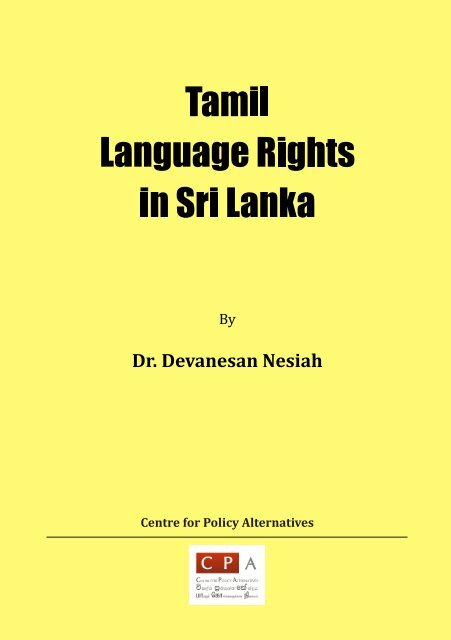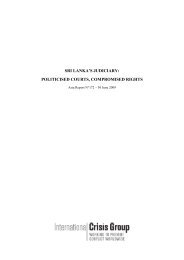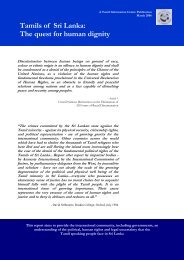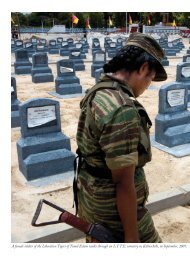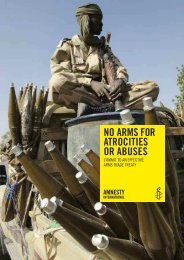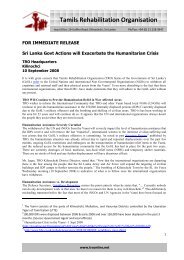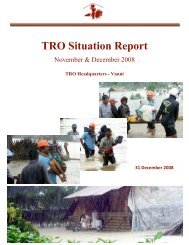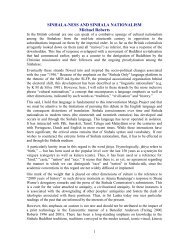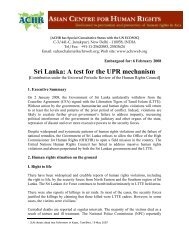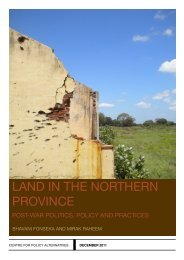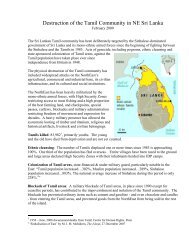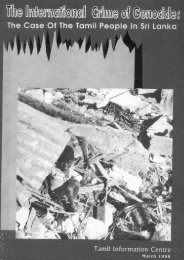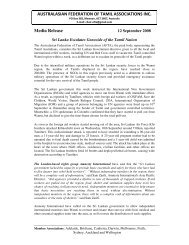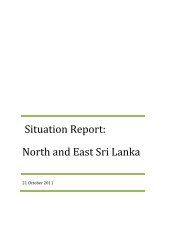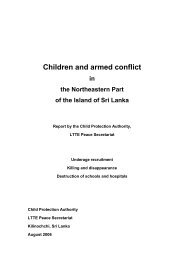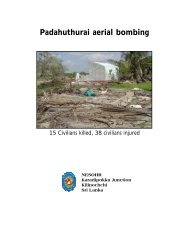Tamil Language Rights Final.pmd - Ilankai Tamil Sangam
Tamil Language Rights Final.pmd - Ilankai Tamil Sangam
Tamil Language Rights Final.pmd - Ilankai Tamil Sangam
Create successful ePaper yourself
Turn your PDF publications into a flip-book with our unique Google optimized e-Paper software.
<strong>Tamil</strong><br />
<strong>Language</strong> <strong>Rights</strong><br />
in Sri Lanka<br />
By<br />
Dr. Devanesan Nesiah
<strong>Tamil</strong> <strong>Language</strong> <strong>Rights</strong><br />
in Sri Lanka<br />
Edited By : Dr. Devanesan Nesiah<br />
ISBN : 978-955-1655-86-0<br />
Published : April 2012<br />
Printers : Globe Printing Works Tel: 011-2689259<br />
The Centre for Policy Alternatives (CPA) is an independent,<br />
non-partisan organization that focuses primarily on issues<br />
of governance and conflict resolution. Formed in 1996 in the<br />
firm belief that the vital contribution of civil society to the<br />
public policy debate is in need of strengthening, CPA is<br />
committed to programmes of research and advocacy through<br />
which public policy is critiqued, alternatives identified and<br />
disseminated.<br />
2<br />
Address : 24/2 28th Lane, off Flower Road, Colombo 7<br />
Telephone : +94 (11) 2565304/5/6<br />
Fax : +94 (11) 4714460<br />
Web : www.cpalanka.org<br />
Email : info@cpalanka.org
CONTENTS<br />
FOREWORD --------------------------------------------------------------- 5<br />
INTRODUCTION ---------------------------------------------------------- 9<br />
CHAPTER I ---------------------------------------------------------------- 12<br />
CHAPTER II<br />
RECOMMENDATIONS ------------------------------------------- 27<br />
LONG TERM MEASURES ---------------------------------------- 36<br />
IMPLEMENTATION AND MONITORING -------------------- 44<br />
CHAPTER III -------------------------------------------------------------- 47<br />
LANGUAGE POLICY ---------------------------------------------- 48<br />
EDUCATION ------------------------------------------------------- 52<br />
PEACE EDUCATION --------------------------------------------- 55<br />
COMMENTS RELATING TO THE ABOVE EXTRACTS<br />
FROM THE LLRC REPORT-------------------------------------- 56<br />
CHAPTER IV<br />
THE LANGUAGES OF SRI LANKA:<br />
A CONSTITUTION FOR NATIONAL UNITY ----------------- 63<br />
3
.<br />
4
FOREWORD<br />
After my schooling in Jaffna and Colombo<br />
and my under graduate studies in Colombo,<br />
I was recruited to the Ceylon Civil Service<br />
in April 1959, not long after Sinhala was<br />
made the only Official <strong>Language</strong>. I retired<br />
in April 1995, a few years after the passage<br />
of the 13th and 16th Ammendments to the<br />
Constitution, which introduced <strong>Tamil</strong> also<br />
as an Official <strong>Language</strong>. In the intervening<br />
36 years, I served a total of 11 years in<br />
Badulla, Mannar, Batticaloa and Jaffna<br />
Districts. Badulla was bilingual but the<br />
other three Districts were predominently<br />
<strong>Tamil</strong> Speaking.<br />
In the course my work I became very much<br />
aware and sensitive to the language problems<br />
of the people. This little monograph is the<br />
outcome of the awareness I gained in the<br />
course of my duties and subsequent research.<br />
I have often travelled in the hill country<br />
and past Haputale Church with a lovely<br />
view, sometimes stretching out south to<br />
the Indian Ocean. That Churchyard<br />
contains the ashes of W.S. Senior whose<br />
haunting verses titled The Call of Lanka are<br />
included in this monograph.<br />
I wish to greatfully acknowledge the help<br />
given in different ways by Lionel Guruge,<br />
5
Asoka Herath, Kamaladevi Sasichandran &<br />
Lanka Nesiah to bring out this monograph.<br />
My special thanks are due to the Editor of<br />
The Island who published a series of four<br />
articles by me on this subject in the course<br />
of March 2012. This monograph is based<br />
on those articles.<br />
Devanesan Nesiah April 2012<br />
THE CALL OF LANKA - W.S. SENIOR,<br />
former Vice Principal, Trinity College<br />
I climbed o’er the crags of Lanka<br />
And gazed on her golden sea,<br />
And out from her ancient places<br />
her soul came forth to me.<br />
“Give me a Bard,” said Lanka,<br />
“My Bard of the things to-be”<br />
“My cities are laid in ruins,<br />
“Their courts through the jungle spread,<br />
“My sceptre is long departed<br />
“And the stranger lord instead.<br />
“Yet give me a Bard” said Lanka,<br />
“I am living, I am not dead.”<br />
6<br />
“ For high in my highland valleys,<br />
“And low in my lowland plains<br />
“The pride of the past is pulsing<br />
“Hot, in a people’s veins.<br />
“Give me a Bard,” said Lanka,<br />
“A Bard for my joys and pains.”
I offer a voice, O Lanka,<br />
I, child of an alien isle,<br />
For my heart has heard thee, and kindled,<br />
Mine eyes have seen thee, and smile;<br />
Take, Foster-Mother, and use it;<br />
Tis but for a little while.<br />
For surely of thine own children,<br />
Born of thy womb, shall rise<br />
The Bard of the Moonlit jungle,<br />
The Bard of the tropic skies,<br />
Warm from his Mother’s bosom,<br />
Bright from his Mother’s eyes.<br />
He shall hymn thee of hoar Sripada,<br />
The peak that is lone and tall;<br />
He shall hymn with her crags Dunhinda,<br />
The smoking waterfall.<br />
Whatsoever is fair in Lanka<br />
He shall know it and love it all.<br />
He shall sing thee of sheer Sigiriya,<br />
Of Minneryiya’s wandering kine;<br />
He shall sing of the lake and the lotus,<br />
He shall sing of the rock - hewn shrine;<br />
whatsoever is old in Lanka<br />
Shall live in his lordly line.<br />
But most shall he sing of Lanka<br />
In the brave new days that come,<br />
When the races all have blended<br />
And the voice of strife is dumb;<br />
When we leap to a single bugle,<br />
March to a single drum.<br />
7
March to a mighty purpose,<br />
One man from shore to shore,<br />
The stranger become a brother,<br />
The task of the tutor o’er;<br />
When the ruined city rises,<br />
And the Palace gleams once more.<br />
Hark ! Bard of the fateful Future,<br />
Hark ! Bard of the bright To-Be<br />
A Voice on the verdant mountains,<br />
A Voice on the golden sea;<br />
Rise, Child of Lanka, and answer !<br />
Thy Mother hath called to Thee.<br />
Concluded<br />
8
INTRODUCTION<br />
“<strong>Tamil</strong> <strong>Language</strong> <strong>Rights</strong> in Sri Lanka”, is<br />
written by a distinguished former civil<br />
servant and a valued colleague at CPA.<br />
DrDevanesanNesiah also headed the team<br />
appointed in 1998 by the Official <strong>Language</strong><br />
Commission of Sri Lanka to conduct an<br />
Audit on the Use of <strong>Tamil</strong> as an Official<br />
<strong>Language</strong> in the provinces outside of the<br />
NorthEast. Consequently, thismonograph<br />
is enriched with both experience and<br />
expertise on a subject that was at the<br />
heart of the ethnic conflict in Sri Lanka<br />
and one that continues to be integral to<br />
the challenge of our transition from a postwar<br />
society to a post-conflict one.<br />
<strong>Language</strong> rights are integral to peace,<br />
reconciliation and unity in a pluralist<br />
society such as Sri Lanka. Our inability<br />
and/or unwillingness to incorporate the<br />
language rights of all the peoples of the<br />
country in its laws, administrative rules,<br />
regulations and practices came to<br />
symbolize discrimination and<br />
institutionalize alienation which eventually<br />
found expression in armed revolt against<br />
the state. Demands for federalism and<br />
autonomy were obscured by the more<br />
extreme one of secession, the pain and<br />
suffering of an ethnic war, with its<br />
attendant atrocities of terrorism and most<br />
recently allegations of war crimes.<br />
9
Three years after the end of the war in<br />
2009, the government has declared a<br />
policy goal of trilingualism throughout the<br />
country. The recommendations of both the<br />
<strong>Language</strong> Audit of 1998 and the Lessons<br />
Learned and Reconciliation Commission<br />
(LLRC) reproduced in this monograph, will<br />
hopefully be heeded and the goal pursued<br />
in earnest. Progress in this respect will<br />
also, no doubt, help allay international<br />
concerns following the resolution in the<br />
UN Human <strong>Rights</strong> Council on the<br />
implementation of the LLRC<br />
recommendations.<br />
10<br />
<strong>Language</strong> is integral to identity and<br />
accordingly, in a social context, to a sense<br />
of belonging, equal citizenship and most<br />
importantly to basic human rights and<br />
dignity. <strong>Language</strong> rights are enshrined in a<br />
number of international instruments on<br />
human rights and governance, reinforcing<br />
the contention that the respect for and<br />
fulfillment of language rights in Sri Lanka<br />
are also part of our international<br />
obligations as responsible members of the<br />
international community. The pursuit of<br />
economic development too, will be greatly<br />
facilitated and enjoy greater legitimacy<br />
amongst the people it directly impacts on, if<br />
it were underpinned by language rights.<br />
Development is first and foremost an<br />
investment in the welfare and wellbeing of<br />
people; it is to be measured most<br />
fundamentally by their belief in it as
stakeholders, equal citizens and active<br />
participants.<br />
Since the establishment of the Official<br />
<strong>Language</strong> Commission some two decades<br />
ago, rhetorical commitment to upholding<br />
<strong>Tamil</strong> language rights notwithstanding,<br />
practical implementation has been<br />
woefully lacking. The recommendations of<br />
the Audit in 1998 and the LLRC over a<br />
decade later, chart the lack of progress in<br />
this regard and the persistence of<br />
challenges of mind set, political<br />
commitment and resources.<br />
Upholding <strong>Tamil</strong> language rights in Sri<br />
Lanka will not be sufficient for ensuring<br />
peace, reconciliation and unity. However, it<br />
incontestably constitutes part of a package<br />
of reforms that are necessary for peace,<br />
reconciliation and unity. At the heart of<br />
the challenge is not the availability of<br />
resources; it is political commitment and<br />
mind –set as it is for the other issues that<br />
are in need of resolution for Sri Lanka to<br />
become the truly, sustainable post-conflict<br />
society with democratic governance<br />
desired by all of its peoples.<br />
Dr.Paikiasothy Saravanamuttu<br />
Executive Director<br />
11
<strong>Tamil</strong> <strong>Language</strong> <strong>Rights</strong><br />
in Sri Lanka<br />
CHAPTER I<br />
Sinhala <strong>Language</strong> rights have been<br />
largely secured since the Official<br />
<strong>Language</strong> Act of 1956. I will therefore<br />
focus mainly on <strong>Tamil</strong> <strong>Language</strong> rights<br />
and, to a less extent, on English<br />
<strong>Language</strong> rights. It would be useful to<br />
begin with a brief historical outline.<br />
Jaffna<br />
Youth<br />
Congress<br />
(JYC)<br />
12<br />
English was the Official <strong>Language</strong><br />
through the British period and into the<br />
first decade after independence. The<br />
agitation for the use of National<br />
<strong>Language</strong>s in the administration and<br />
Education was led by the Jaffna Youth<br />
Congress (JYC), prominent among<br />
whose leadership was the late Handy<br />
Perinbanayagam. The Gandhiinspired<br />
JYC, comprising almost<br />
entirely of young school teachers and<br />
senior students, established cordial<br />
relationship with all the political<br />
leaders outside Jaffna (Kandyan and
Low Country Sinhalese, Moor and<br />
Malay, Hill Country, Vanni and Eastern<br />
<strong>Tamil</strong>) as well as with major Indian<br />
leaders including Gandhi, Nehru and<br />
Rajagopalachari. The JYC peaked in the<br />
1920s and early 30s, but gradually<br />
faded thereafter.<br />
In keeping with JYC policy, leading<br />
schools in Jaffna taught Sinhala, <strong>Tamil</strong><br />
and English as compulsory languages.<br />
They wanted independence<br />
immediately and, for this reason,<br />
opposed the Donoughmore reforms<br />
as too little too late and boycotted the<br />
1931 State Council elections under the<br />
Donoughmore reforms. In 1931, the<br />
boycott was a 100% success in the<br />
Jaffna Peninsula and even the <strong>Tamil</strong><br />
nationalists who did not approve of<br />
the boycott contested outside the<br />
Peninsula (eg, G G Ponnanbalam who<br />
contested and lost in Mannar). The<br />
boycott obviously could not be<br />
sustained and there was no boycott<br />
when the 1936 State Council election<br />
came around. Unfortunately, the<br />
boycott call by the JYC in 1931<br />
The boycott<br />
in Jaffna of<br />
the 1931<br />
State<br />
Council<br />
elections<br />
13
The decline<br />
of the Jaffna<br />
Youth<br />
Congress<br />
and the rise<br />
of the <strong>Tamil</strong><br />
Congress<br />
The<br />
exclusion of<br />
the Hill<br />
Country<br />
<strong>Tamil</strong>s from<br />
citizenship<br />
and voting<br />
rights<br />
14<br />
backfired in that the young antiimperialist<br />
intellectuals of the JYC were<br />
dismissed as romantic idealists. This<br />
gave the <strong>Tamil</strong> Congress a head start<br />
over the Youth Congress and G.G.<br />
Ponnambalam maintained his<br />
dominance so gained over <strong>Tamil</strong><br />
politics for two decades since 1936.<br />
Over this period the interethnic<br />
goodwill built up by the JYC gradually<br />
eroded.<br />
In the mean time J. R. Jayawardene<br />
moved a resolution in the State Council<br />
in 1944 to make Sinhala the only<br />
Official <strong>Language</strong> and the medium of<br />
instruction in schools. Before it was<br />
put to the vote an amendment was<br />
moved by V. Nalliah to substitute<br />
Sinhala and <strong>Tamil</strong> for Sinhala only. The<br />
amendment was accepted and<br />
adopted. But some communal ill will<br />
and a feeling of insecurity among<br />
<strong>Tamil</strong>s and Muslims had been created.<br />
The <strong>Tamil</strong> Congress won nearly all the<br />
seats in the Northern electorates in the<br />
1947 election to the new House of<br />
Representatives. The UNP co-opted
the <strong>Tamil</strong> Congress into supporting<br />
legislation excluding the Hill Country<br />
<strong>Tamil</strong>s from citizenship and voting<br />
rights. S.J.V. Chelvanayakam quit the<br />
<strong>Tamil</strong> Congress and formed the<br />
Federal Party (ITAK) on this issue but<br />
the Federal Party was overshadowed<br />
by the <strong>Tamil</strong> Congress in Jaffna in the<br />
1952 Parliamentary elections. From<br />
1956 onwards in the wake of Sinhala<br />
only. <strong>Tamil</strong> leadership was taken over<br />
by the Federal Party led by S.J.V<br />
Chelvanayakam and sustained for<br />
over two decades till he passed away<br />
in the late 70s. The Federal Party<br />
campaigned vigorously and<br />
successfully against secession at every<br />
election till 1977. During this time the<br />
Federal Party enjoyed the support of<br />
the Muslims of the North and East.<br />
Muslim representatives of the region<br />
voted against Sinhala Only whereas the<br />
Muslim leaders based outside the<br />
North and East voted for Sinhala Only<br />
with the sole exception of Senator<br />
A.M.A. Azeez (originally from Jaffna)<br />
who quit the UNP on this issue and<br />
voted against the Sinhala Only Bill.<br />
The rise of<br />
the Federal<br />
Party<br />
North East<br />
Muslim<br />
Parliamentarians<br />
vote<br />
against<br />
Sinhala only<br />
15
Sinhala as<br />
the only<br />
Official<br />
<strong>Language</strong><br />
and the<br />
deepening<br />
of the ethnic<br />
divide<br />
A missed<br />
opportunity<br />
16<br />
The 1956 elections in which the two<br />
major Sinhalese led parties, viz. the<br />
SLFP (part of a coalition termed MEP)<br />
and the UNP campaigned for Sinhala<br />
as the only Official <strong>Language</strong> widened<br />
the ethnic divide. The Marxist LSSP and<br />
CP campaigned for Sinhala and <strong>Tamil</strong><br />
as official languages and, having earlier<br />
signed a no-contest pact with the SLFP,<br />
secured a significant number of seats<br />
outside the North and East, but made<br />
little impact in the North or East. The<br />
CP won one seat in the North and,<br />
countrywide, the LSSP ended up as the<br />
second largest party in Parliament.<br />
Neither they nor the <strong>Tamil</strong> parties<br />
sought to forge an effective political<br />
alliance. Such an alliance, also<br />
incorporating the parties representing<br />
the Hill Country <strong>Tamil</strong>s and the non-<br />
Left liberal Sinhalese, may well have<br />
been able to form a government after the<br />
1947 elections and changed the course<br />
of our history, avoiding the loss of<br />
citizenship and voting rights of Hill<br />
Country <strong>Tamil</strong>s, the exclusion of <strong>Tamil</strong><br />
as an official language, and the<br />
succession of riots, pogroms and the<br />
civil war that followed. In the event the
communal rift widened over the years.<br />
The Federal Party swept the 1956 polls<br />
in the North and East and the MEP in<br />
the rest of the country. The ethnic<br />
polarization that began even before<br />
independence hardened, thawed from<br />
time to time, but is now firmly set and<br />
again hardening.<br />
A consequence of the Muslim MPs<br />
representing electorates outside the<br />
North and East voting for Sinhala Only<br />
in line with the dictates of their<br />
political parties (UNP and SLFP) was<br />
the emergence of the Sri Lanka Muslim<br />
Congress under the leadership of M.H.<br />
M. Ashraff to safeguard the interests<br />
of the Muslims of the North and East.<br />
This party has since secured some<br />
electorates outside the North and East<br />
and emerged as the leading party of the<br />
Muslims of Sri Lanka. Till his<br />
untimely death in a tragic accident<br />
Ashraff’s relationship with the Federal<br />
Party remained good.<br />
The 1981 census (the last published all<br />
island census) indicated that the <strong>Tamil</strong><br />
speaking communities (Sri Lankan<br />
The rise of<br />
the Sri<br />
Lanka<br />
Muslim<br />
Congress<br />
Ashraff and<br />
SLMC<br />
expand their<br />
influence<br />
island wide<br />
but Ashraff<br />
meets with<br />
untimely<br />
death<br />
17
The fall out<br />
from<br />
Sinhala<br />
Only<br />
Indian<br />
Federalism<br />
18<br />
<strong>Tamil</strong>s, Muslims/Moors and<br />
Upcountry <strong>Tamil</strong>s), then constituted<br />
30% of the population, the Sinhalese<br />
(Kandyan and Low Country) 69% and<br />
the others less than one percent. Since<br />
1981 the ethnic proportions have<br />
changed significantly on account of<br />
emigration (disproportionately high<br />
among <strong>Tamil</strong>s). In terms of language<br />
use, a small section of <strong>Tamil</strong> speakers,<br />
especially Muslims, have gained<br />
Sinhala literacy. However, Sri Lankans<br />
remain predominantly monolingual.<br />
The manner in which Sinhala was<br />
made the Official <strong>Language</strong> and the<br />
accompanying and consequent<br />
violence has impeded the spread of<br />
Sinhala literacy among <strong>Tamil</strong>s. Sri<br />
Lanka’s education system also has not<br />
been conducive to the spread of<br />
bilingualism and trilingualism. This is<br />
in sharp contrast to the situation in<br />
India where, despite much lower<br />
literacy levels, the education system is<br />
geared to promoting multilingualism,<br />
which has been a major factor in<br />
building national unity in that country.
Another significant feature in India is<br />
that it is federal with many Linguistic<br />
States, each governed predominantly<br />
in the Indian National <strong>Language</strong> of that<br />
State with provision for numerically<br />
significant linguistic minorities within<br />
each State to use their languages. For<br />
example, <strong>Tamil</strong> is the Official <strong>Language</strong><br />
of the State of <strong>Tamil</strong>nadu but there is<br />
provision for pockets of those speaking<br />
Malayalam, Kannada and Telugu<br />
within the boundaries of <strong>Tamil</strong>nadu to<br />
use their respective languages. In turn,<br />
significant pockets of <strong>Tamil</strong> speakers<br />
within the borders of Kerala, Karnataka<br />
and Andhra are able to use <strong>Tamil</strong> in<br />
education and in dealing with the State.<br />
All these contribute to nation building.<br />
In contrast Sri Lankans remain<br />
predominantly monolingual and the<br />
administration does not cater<br />
adequately to the national minorities<br />
(mostly <strong>Tamil</strong> speakers) or to the<br />
regional minorities (whether Sinhala<br />
or <strong>Tamil</strong> speakers). In consequence<br />
the Sri Lankan Nation is now ethnically<br />
more fractured than ever before.<br />
The<br />
upholding of<br />
Monolingualism<br />
in Sri Lanka<br />
and<br />
Multilingualism<br />
in India<br />
Marginalization<br />
of linguistic<br />
minorities in Sri<br />
Lanka<br />
19
The<br />
introduction<br />
of <strong>Tamil</strong> as<br />
an Official<br />
<strong>Language</strong><br />
and English<br />
as a Link<br />
<strong>Language</strong><br />
through the<br />
13th<br />
Amendment<br />
The Current<br />
Constitutional<br />
Status of<br />
Sinhala, <strong>Tamil</strong><br />
and English in<br />
Administration<br />
20<br />
It is likely that the proportion of<br />
Sinhala speakers now is over 75% and<br />
that of <strong>Tamil</strong> speakers less than 25%.<br />
On the other hand the laws in respect<br />
of language use have changed. Sinhala<br />
was made the only Official <strong>Language</strong><br />
in 1956 and this was embedded in to<br />
the 1972 and 1978 Constitutions. The<br />
Thirteenth Amendment of 1987, in<br />
some convoluted text introduced<br />
<strong>Tamil</strong> also as an Official <strong>Language</strong><br />
(without undermining the historical<br />
status of Sinhala as the Official<br />
<strong>Language</strong>) and English as the Link<br />
<strong>Language</strong>. The relevant article 18 of the<br />
Constitution now reads as follows:<br />
18 (1) The official language of Sri<br />
Lanka shall be Sinhala.<br />
(2) <strong>Tamil</strong> shall also be an official<br />
language.<br />
(3) English shall be the link language.<br />
(4) Parliament shall by law provide for<br />
the implementation of the provisions<br />
of this Chapter.<br />
By virtue of the 16 th Amendment of<br />
1988 <strong>Tamil</strong> was affirmed as a language
of administration throughout Sri<br />
Lanka, and its new status spelt out in<br />
greater detail, though again in<br />
convoluted text. <strong>Tamil</strong> too is now an<br />
Official, Administrative and Court<br />
<strong>Language</strong> and English is the Link<br />
<strong>Language</strong>, but also used in<br />
administration to a less extent. The<br />
revised articles 22 (1), (2) and (3) of<br />
the Constitution now read as follows:<br />
Extending<br />
the<br />
Legislative<br />
Positions of<br />
<strong>Tamil</strong> and<br />
English<br />
through the<br />
16th<br />
Amendment<br />
“<strong>Language</strong> of Administration<br />
22(1) Sinhala and <strong>Tamil</strong> shall be the<br />
languages of administration through<br />
out Sri Lanka and Sinhala shall be the<br />
language of administration and be<br />
used for the maintenance of public<br />
records and the transaction of all<br />
business by public institutions of all<br />
the provinces of Sri Lanka other than<br />
the Northern and Eastern provinces<br />
where <strong>Tamil</strong> shall be so used:<br />
Provided that the President may,<br />
having regard to the proportion which<br />
the Sinhala or <strong>Tamil</strong> linguistic minority<br />
population in any unit comprising a<br />
division of an Assistant Government<br />
<strong>Language</strong><br />
Provisions<br />
under the 16th<br />
Amendment<br />
21
Agent, bears to the total of population<br />
of that area, direct that both Sinhala<br />
and <strong>Tamil</strong> or a language other than the<br />
language used as the language of<br />
administration in the province in<br />
which such area may be situate, be<br />
used as the language of administration<br />
for such area,<br />
(2) In any area where Sinhala is used<br />
as the language of administration a<br />
person other than an official acting in<br />
his official capacity, shall be entitled-<br />
(a) To receive communications from<br />
and to communicate and transact<br />
business with, any official in his official<br />
capacity, in either <strong>Tamil</strong> or English;<br />
<strong>Language</strong>s of<br />
Offical<br />
Communication<br />
and<br />
Documentation<br />
22<br />
(b) If the law recognizes his right to<br />
inspect or to obtain copies of or<br />
extracts from any official register,<br />
record, publication or other document,<br />
to obtain a copy of, or an extract from<br />
such register, record, publication or<br />
other document, or a translation<br />
thereof, as the case may be, in either<br />
<strong>Tamil</strong> or English;
(c) Where a document is executed by<br />
any official for the purpose of being<br />
issued to him, to obtain such document<br />
or a translation thereof, in either <strong>Tamil</strong><br />
or English.<br />
(3) In any area where <strong>Tamil</strong> is used as<br />
the language of administration, a<br />
person other than an official acting in<br />
his official capacity shall be entitled to<br />
exercise the rights and obtain the<br />
services referred to in sub–<br />
paragraphs (a), (b) and (c) of<br />
paragraph (2) of this Article, in Sinhala<br />
or English.<br />
The revised Article 24 (1) now reads<br />
as follows:<br />
Article 24 “(1) Sinhala and <strong>Tamil</strong> shall<br />
be the languages of the courts<br />
throughout Sri Lanka and Sinhala shall<br />
be used as the language of the courts<br />
situated in all areas of Sri Lanka except<br />
those in any area where <strong>Tamil</strong> is the<br />
language of administration. The record<br />
and proceedings shall be in the<br />
language of the court. In the event of<br />
an appeal from any court, records shall<br />
The<br />
<strong>Language</strong>s of<br />
the Courts<br />
23
also be prepared in the language of the<br />
court hearing the appeal, if the<br />
language of such court is other than the<br />
language used by the court from which<br />
the appeal is referred:<br />
Provided that the Minister in charge of<br />
the subject of Justice may, with the<br />
concurrence of the Cabinet of<br />
Ministers direct that the record of any<br />
court shall also be maintained and the<br />
proceedings conducted in a language<br />
other than the language of the court”<br />
Gap<br />
between<br />
de jure and<br />
de facto<br />
<strong>Language</strong><br />
<strong>Rights</strong><br />
24<br />
Despite these and other improvements<br />
in the Constitution and other<br />
regulations to provide for greater use<br />
of <strong>Tamil</strong> in administration, there is<br />
very little benefit to <strong>Tamil</strong> speakers on<br />
the ground. The <strong>Language</strong> Audit of 30<br />
December 1998 submitted (by a team<br />
led by myself) to the Official <strong>Language</strong>s<br />
Commission pointed out (p6) that:<br />
a) There have been chronic<br />
shortages of <strong>Tamil</strong> speaking<br />
cadres and no serious attempt<br />
appears to have been made to<br />
correct this deficiency in any of<br />
the offices visited, although they all<br />
served large numbers of <strong>Tamil</strong>
speaking people. In consequence,<br />
<strong>Tamil</strong> speaking persons are often<br />
compelled to transact their<br />
business in Sinhala (sometimes<br />
through interpreters whom they<br />
bring along) or, in a few cases, in<br />
English.<br />
Some of the<br />
problems<br />
faced by<br />
<strong>Tamil</strong><br />
Speakers<br />
b) Even officers who had passed<br />
<strong>Tamil</strong> proficiency examinations<br />
and drawn incentive allowances<br />
appeared to be mostly unable to<br />
work in <strong>Tamil</strong>, particularly in<br />
relation to correspondence.<br />
c) Basic equipment such as<br />
typewriters was not available or<br />
was in short supply in many<br />
offices. In some offices there were<br />
one or two <strong>Tamil</strong> typewriters but<br />
no <strong>Tamil</strong> typists.<br />
d) Even simple and low cost<br />
measures such as having all name<br />
and direction boards and notices<br />
in Sinhala and <strong>Tamil</strong> had not been<br />
taken in most offices.<br />
e) None of the offices had a complete<br />
set of the legal documents and<br />
circulars issued by the Ministry of<br />
Chronic<br />
Shortages<br />
of <strong>Tamil</strong><br />
Speaking<br />
cadres<br />
25
The <strong>Tamil</strong><br />
<strong>Language</strong><br />
Audit of<br />
1998<br />
Public Administration and the<br />
Official <strong>Language</strong>s Commission.<br />
The basic problem was identified as the<br />
crippling shortage of <strong>Tamil</strong> speaking<br />
officers despite the fact that eleven<br />
years had passed since <strong>Tamil</strong> was also<br />
made an official language. No notice<br />
appeared to have been taken of the<br />
ethnic composition of the various<br />
districts when recruitments and<br />
postings were done.<br />
26
<strong>Tamil</strong> <strong>Language</strong> <strong>Rights</strong><br />
in Sri Lanka<br />
CHAPTER II<br />
This part consists of Recommendations<br />
made over 13 years ago to the Official<br />
<strong>Language</strong> Commission (OLC) by a<br />
team headed by the writer and<br />
appointed by the OLC to conduct an<br />
Audit on the Use of <strong>Tamil</strong> as an Official<br />
<strong>Language</strong> in provinces outside the<br />
North East. Although the Audit did<br />
not research the North or East, the<br />
Recommendations relate to the whole<br />
Island and cover the use of Sinhala in<br />
the North and East. The<br />
recommendations dated 30 December<br />
1998 include far reaching changes,<br />
most of which remain valid but<br />
unimplemented. For this reason they<br />
are reproduced unchanged:<br />
RECOMMENDATIONS<br />
If the administration is to meet the<br />
needs of the <strong>Tamil</strong> speaking people,<br />
Failure to<br />
implement<br />
<strong>Tamil</strong><br />
<strong>Language</strong><br />
Regulations<br />
27
there should be a sufficient number of<br />
<strong>Tamil</strong> proficient officials in state<br />
institutions and corporations. The<br />
officials needed will be translators,<br />
clerks, typists and others as well as<br />
departmental grades, such as police<br />
personnel at all levels. Recruitment of<br />
adequate numbers of <strong>Tamil</strong> speaking<br />
staff is essential. But this cannot be done<br />
overnight. The team realises that<br />
immediate, short term and long term<br />
measures are needed.<br />
Recommendations<br />
for immediate<br />
implementation<br />
The first urgent need is a consensus<br />
between the Ministry of Public<br />
Administration, Ministry of Finance &<br />
Planning, Salaries and Cadre<br />
Committee and the Official <strong>Language</strong>s<br />
Commission on the immediate, short<br />
term and long term measures needed<br />
to implement <strong>Tamil</strong> as an Official<br />
<strong>Language</strong>. Based on our <strong>Language</strong><br />
Audit, we have formulated following<br />
proposals for consideration.<br />
28
Immediate Measures (to be taken<br />
within the next few weeks)<br />
(a) Identify constraints like lack of<br />
equipment, documents etc, and take<br />
immediate measures to purchase the<br />
equipment needed, print the<br />
documents, etc, using available funds<br />
or savings under other items in the<br />
budget.<br />
(b) Convert all monolingual and<br />
bilingual name and direction boards<br />
into trilingual name and direction<br />
boards. The cost of doing this will be<br />
minimal and it is unlikely that any<br />
additional resources will need to be<br />
allocated for this exercise.<br />
(c) Withdraw all forms in the<br />
Department that are not trilingual,<br />
destroy them and have the forms<br />
printed by the Government Printer in<br />
all three languages on the same paper.<br />
The Government Printer should be<br />
asked to give top priority to this work.<br />
(d) Instruct all public servants to comply<br />
with Government policy in regard to<br />
the use of the national languages,<br />
particularly reminding them of<br />
Measures<br />
recommended<br />
to be taken<br />
immediately<br />
Public<br />
Servants to<br />
be given<br />
clear<br />
directions<br />
regarding<br />
the<br />
<strong>Language</strong><br />
<strong>Rights</strong> of<br />
the Public<br />
29
widespread failure to implement<br />
<strong>Tamil</strong> as an official language.<br />
(e)<br />
A circular setting out the language<br />
policy of the government in relation<br />
to the use of <strong>Tamil</strong> may be jointly<br />
drafted by the Ministry of Public<br />
Administration and the Official<br />
<strong>Language</strong>s Commission, and<br />
circulated to all offices and sub-offices.<br />
The Circular should detail the<br />
obligations of the public servants in<br />
relation to dealings with <strong>Tamil</strong><br />
speaking persons.<br />
Short Term Measures (to be taken<br />
during the course of the year 1999)<br />
Measures<br />
Recommended<br />
to be taken<br />
in the<br />
course of<br />
1999<br />
30<br />
(a)<br />
Identify the Departments and the<br />
Service Grades that need fresh<br />
recruitment of <strong>Tamil</strong> speaking<br />
officers to enable full implementation<br />
of the <strong>Language</strong> Policy of the<br />
Government. This Identification may<br />
be done by the Ministry of Public<br />
Administration in consultation with<br />
the Official <strong>Language</strong>s Commission<br />
within a three or four month’s time<br />
frame.
(b)<br />
(c)<br />
(d)<br />
The Official <strong>Language</strong>s Commission<br />
could seek government approval for<br />
the special recruitment of the<br />
required numbers of <strong>Tamil</strong> speaking<br />
cadres. The new appointment may be<br />
set off against existing vacancies and,<br />
if there are not enough vacancies<br />
additional posts could be created on<br />
the understanding that other<br />
recruitment would be suspended till<br />
the excess disappears through natural<br />
wastage.<br />
Thereafter the Secretary, Ministry of<br />
Public Administration could call for<br />
applications from suitable candidates,<br />
specifying the special <strong>Tamil</strong><br />
<strong>Language</strong>s provisions required in<br />
respect of oral, reading and writing<br />
skills at the point of recruitment. In<br />
this recruitment, preference should be<br />
given to those with skills in a second<br />
or third language.<br />
The Ministry of Public Administration<br />
should post the officers according to<br />
the needs of each Department. The<br />
Official <strong>Language</strong>s Commission<br />
should, before postings are made, be<br />
Special<br />
Recruitment<br />
of <strong>Tamil</strong><br />
Speaking<br />
Cadres<br />
Recruitment<br />
Criteria in<br />
respect of<br />
<strong>Language</strong><br />
Competency<br />
31
consulted in working out the rules<br />
governing language competency in the<br />
respective offices. It should be<br />
possible to complete this process and<br />
make necessary appointments within<br />
1999.<br />
Accelerated<br />
<strong>Language</strong><br />
Trainning<br />
Programmes<br />
32<br />
(e)<br />
(f)<br />
(g)<br />
Training programmes in Sinhala,<br />
<strong>Tamil</strong> and English should be initiated<br />
island to enable all categories of<br />
officers to gain proficiency in at least<br />
two and, if possible, all three<br />
languages.<br />
All induction and selected training<br />
courses should incorporate modules<br />
relating to the language policy of the<br />
state and awareness of relevant<br />
provisions of the Constitution.<br />
Public awareness should be built up<br />
of the right of every person to<br />
transact business with any<br />
government office in any part of the<br />
Island in Sinhala, <strong>Tamil</strong> or English, and<br />
of the obligation cast on the offices<br />
and officers concerned to provide such<br />
services including replying letters in<br />
the language used by the writer and<br />
issuing any extract or translation of
any record, registration, publication<br />
or other document in the language<br />
chosen by the applicant.<br />
(h) In order to motivate officers to<br />
gain proficiency in all three<br />
languages, a new incentive<br />
scheme should he introduced<br />
consisting of fixed sums on<br />
passing the relevant<br />
examinations and a monthly<br />
allowance for using the additional<br />
language in day to day work. The<br />
incentive allowance must be paid<br />
only to those officers who work,<br />
in addition to their normal duties,<br />
in a language other than their first<br />
language. There should be a strict<br />
check on this payment and<br />
appropriate norms should be<br />
established. Those who draw the<br />
monthly allowance should be<br />
available for posting outstation as<br />
required.<br />
Incentives<br />
for second<br />
and third<br />
language<br />
competency<br />
(i)<br />
After providing the staff, there<br />
should be periodic monitoring.<br />
Due consideration should be<br />
33
given to public complaints. The<br />
Official <strong>Language</strong>s Commission<br />
should bring to the notice of the<br />
President any shortcomings or<br />
any lethargic attitude in any<br />
Ministry/Dept. for action that the<br />
President may deem fit.<br />
(j)<br />
Presidential directions may be<br />
made as appropriate under<br />
Section 22 (1) of the Constitution,<br />
introduced through the Sixteenth<br />
Amendment, which reads as<br />
follows:<br />
Both<br />
Sinhala and<br />
<strong>Tamil</strong> are<br />
now<br />
<strong>Language</strong>s<br />
of<br />
Administration<br />
throughout<br />
Sri Lanka<br />
34<br />
“Sinhala and <strong>Tamil</strong> shall be languages<br />
of administration throughout Sri<br />
Lanka and Sinhala shall be the<br />
language of administration and be<br />
used for maintenance of public<br />
records and the transaction of all<br />
business by public institutions of the<br />
provinces of Sri Lanka other than<br />
Northern and Eastern Provinces<br />
where <strong>Tamil</strong> shall be used”.<br />
“Provided that the President may,<br />
having regard to the proportion which<br />
the Sinhala or <strong>Tamil</strong> linguistic minority
population in any unit comprising a<br />
Division of an Assistant Government<br />
Agent bears to the total of population<br />
of that area, direct that both Sinhala<br />
and <strong>Tamil</strong> or a language other than the<br />
language used as the language of<br />
administration in the province in<br />
which such area may be situated be<br />
the <strong>Language</strong>s of Administration for<br />
such area”.<br />
It is noted that both Sinhala and <strong>Tamil</strong><br />
are <strong>Language</strong>s of Administration<br />
throughout Sri Lanka but only one<br />
language or the other may be the<br />
language of public record in a<br />
particular province unless there is a<br />
Presidential declaration to the<br />
contrary. It is suggested that early<br />
action should be taken under the<br />
above paragraph to proclaim the<br />
appropriate areas in which a second<br />
or third language should also be used<br />
as languages of public record so that<br />
effective strategies for implementation<br />
of the Official <strong>Language</strong> Policy of the<br />
Government can be worked out. It is<br />
suggested that in any province in<br />
Proclamation<br />
of Areas in<br />
which a 2nd or<br />
3rd <strong>Language</strong><br />
should also be<br />
used as<br />
<strong>Language</strong>s of<br />
Public Record<br />
35
which the language of administration<br />
and public record is Sinhala, <strong>Tamil</strong> is<br />
declared as an additional language of<br />
administration and public record in<br />
those A.G.A.Divisions of the province<br />
in which the proportion of <strong>Tamil</strong><br />
speaking persons is not less than 12<br />
1/2 percent and, likewise, in any<br />
province in which the language of<br />
administration and public record is<br />
<strong>Tamil</strong>, Sinhala is declared as an<br />
additional language of administration<br />
and public record in those A.G.A.<br />
Divisions of the province in which the<br />
proportion of Sinhalese is not less than<br />
12 ½ percent.<br />
LONG TERM MEASURES<br />
Long Term<br />
Measures<br />
36<br />
The team has not visited any offices in<br />
the North East or in the Central, North<br />
Central or Southern Provinces, and is<br />
not in a position to report in respect<br />
of these regions. Our survey has<br />
covered many offices in the Western,<br />
North Western, Uva and<br />
Sabaragamuwa provinces. A<br />
consistent pattern has emerged of a<br />
glaring lack of <strong>Tamil</strong> language
proficiency in virtually every office<br />
audited at all levels, although many of<br />
those offices serve populations of<br />
which very substantial proportions<br />
are <strong>Tamil</strong> speaking.<br />
The highest priority should be given to<br />
correcting oral, reading and writing<br />
language deficiencies. Unless this is<br />
done, the legal requirements in respect<br />
of using the <strong>Tamil</strong> language in<br />
administration cannot be met. It is<br />
essential that the specific language<br />
capacity of each unit of the public<br />
services must be such as to meet the<br />
needs of the population in the language<br />
medium they are most comfortable<br />
with.<br />
While all citizens have the same rights<br />
in all parts of the Island, it may not be<br />
pragmatic to seek to ensure that<br />
every office in every A.G.A. Division<br />
has the same level of competency in<br />
all three languages. Most offices may<br />
have Sinhala or <strong>Tamil</strong> as the language<br />
of official record; many may have<br />
both; a few may have English too. But<br />
all offices need to have minimum<br />
Categories of<br />
A.G.A.<br />
Divisions on<br />
the basis of<br />
population,<br />
and providing<br />
for language<br />
competency<br />
accordingly<br />
37
competency to transact office business<br />
in all three languages. We therefore<br />
make certain proposals below to<br />
ensure that these requirements could<br />
be met.<br />
It is suggested that the various A.G.A.<br />
Divisions may be categorized in terms<br />
of the language composition of the<br />
population as follows:<br />
(i)<br />
Not less than 87 ½ % Sinhala<br />
speaking<br />
(ii) Not less than 87 ½ % <strong>Tamil</strong><br />
speaking<br />
(iii) Not less than 50 % Sinhala<br />
speaking and not less than 12 ½<br />
% <strong>Tamil</strong> speaking<br />
Classification<br />
of officers in<br />
terms of<br />
<strong>Language</strong><br />
Competency<br />
38<br />
(iv) Not less than 50 % <strong>Tamil</strong> speaking<br />
and not less than 12 ½ % Sinhala<br />
speaking<br />
Norms may be prescribed in respect<br />
of each A.G.A. Division above to<br />
determine the minimum requirement<br />
of cadres classified in terms of<br />
language proficiency as follows:
(1) Officers fully proficient and who<br />
can correspond in Sinhala (this<br />
will comprise mostly but not<br />
exclusively those whose mother<br />
tongue is Sinhala; a special high<br />
level proficiency examination<br />
could be prescribed for those<br />
whose mother tongue is not<br />
Sinhala)<br />
(2) Officers fully proficient and who<br />
can correspond in <strong>Tamil</strong> (this will<br />
comprise mostly but not<br />
exclusively those whose mother<br />
tongue is <strong>Tamil</strong>; a special high<br />
level proficiency examination<br />
could be prescribed for those<br />
whose mother tongue is not<br />
<strong>Tamil</strong>)<br />
(3) Officers fully proficient and who<br />
can correspond in English (a high<br />
level proficiency examination<br />
could be prescribed for this<br />
purpose)<br />
(4) Officers who have passed the<br />
prescribed proficiency<br />
examinations in Sinhala other<br />
Posting public<br />
servants to<br />
state<br />
institutions to<br />
meet needs in<br />
terms of<br />
language<br />
requirments<br />
39
than the special high level<br />
examination referred to in (1)<br />
above. (this will comprise mostly<br />
those whose mother tongue is<br />
<strong>Tamil</strong>)<br />
(5) Officers who have passed the<br />
prescribed proficiency<br />
examinations in <strong>Tamil</strong> other than<br />
the special high level examination<br />
referred to in (2) above. (this will<br />
comprise mostly those whose<br />
mother tongue is Sinhala)<br />
Matching<br />
<strong>Language</strong><br />
needs of the<br />
public and<br />
<strong>Language</strong><br />
competency of<br />
the public<br />
services<br />
40<br />
(6) Officers not included in (3) above<br />
but with minimum proficiency in<br />
English<br />
(Proficiency<br />
examinations could be prescribed<br />
for this purpose)<br />
It is suggested that every A.G.A.<br />
Division classified under (i) should<br />
have staff in all cadre grades of at least<br />
50% of (1), 10% of (2), 10% of (3) and<br />
15% of (5). All the Divisions of<br />
Colombo District excluding the<br />
Colombo A.G.A. Division would fall into<br />
this category, and would require a
minimum 10% <strong>Tamil</strong> speaking staff<br />
to meet the recommended norm.<br />
Similarly every A.G.A. Division<br />
classified under (ii) should have staff<br />
in all cadre grades of at least 50% of<br />
(2), 10% of (1), 10% of (3) and 15%<br />
of (4). All the divisions of Batticaloa<br />
district would fall into the category<br />
and would require a minimum of<br />
10% Sinhala speaking staff to meet the<br />
recommended norm.<br />
It is proposed that every A.G.A.<br />
Division classified under (iii) should<br />
have staff in all cadre grades of at least<br />
50% of (1), 25% of (2) and 10% of<br />
(3). Colombo A.G.A. Division would<br />
fall into this category and would<br />
require a minimum of 25% <strong>Tamil</strong><br />
speaking staff to meet the<br />
recommended norm.<br />
Likewise, every A.G.A. Division<br />
classified under (iv) should have staff<br />
in all cadre grade at least 50% of (2),<br />
25% of (1) and 10% of (3). Nuwara<br />
Eliya A.G.A. Division would fall into<br />
this category and would require a<br />
Providing for<br />
institution that<br />
may need high<br />
levels of<br />
English<br />
Proficiency<br />
41
minimum of 50% <strong>Tamil</strong> speaking staff<br />
to meet the recommended norm.<br />
Perhaps similar norms may be<br />
prescribed in respect of each<br />
Municipal and Urban Council<br />
administration based on the linguistic<br />
composition of the population within<br />
the Council limits.<br />
<strong>Language</strong><br />
Training to<br />
supplement<br />
but not<br />
substitute for<br />
<strong>Language</strong><br />
sensitive<br />
recruitment<br />
and posting<br />
42<br />
In addition, there may be particular<br />
institutions that may require high<br />
proficiency in English and for which<br />
enhanced minimum proportions of<br />
categories (3) and (6) could be<br />
prescribed as required. The total<br />
numbers of <strong>Tamil</strong> speaking cadres<br />
required to meet the above norms are<br />
well within the numbers that would<br />
have been available if the principle of<br />
proportional recruitment set out in<br />
the relevant Public Administration<br />
circulars had been followed.<br />
Recruitment policies that ensure<br />
adequate language competencies in<br />
Sinhala, and English would be<br />
compatible with the principle of<br />
proportional recruitment.
To supplement cadre recruitment<br />
designed to achieve the desired<br />
language balance, language training<br />
programmes should be strengthened<br />
and expanded to enable larger<br />
numbers greater proficiency in a<br />
second and, preferably, a third<br />
language. In fact the Ministry of<br />
Defence has initiated 12 weeks<br />
residential training programmes in<br />
Kotmale and Gampaha for police and<br />
armed forces personnel. Such<br />
programmes are long overdue and<br />
should be extended to all grades of the<br />
public service. However it must be<br />
kept in mind that while training could<br />
boost the numbers in categories (4),<br />
(5) and (6) above, and services to the<br />
public could be improved thereby, the<br />
impact of such training on expanding<br />
categories (2) and (3) will be slow and<br />
negligible.<br />
There must be no misconception that<br />
language training could be a substitute<br />
for recruiting adequate numbers of<br />
officers full proficient in respect of<br />
oral, reading and writing the different<br />
Overdue but<br />
welcome<br />
initiative of the<br />
Ministry of<br />
Defence<br />
43
languages; there is no alternative to<br />
providing for the appropriate<br />
balanced language skills at the point of<br />
intake. The language composition of<br />
all new recruits should be such as to<br />
move towards fully meeting all aspects<br />
of language competency (oral, and<br />
writing) in all units of the public<br />
services within five years. The<br />
schemes of recruitment should be<br />
such as to give additional weight to<br />
those with skills in a second or third<br />
language.<br />
IMPLEMENTATION AND<br />
MONITORING<br />
Official<br />
<strong>Language</strong><br />
Commission<br />
to be<br />
empowered to<br />
ensure<br />
compliance<br />
with relevant<br />
Regulations<br />
44<br />
Remedial measures, however<br />
comprehensive, may not yield the<br />
desired results without an effective<br />
implementation and monitoring<br />
system, backed by political will. Our<br />
findings suggest that, by and large the<br />
problems arise less from defects in the<br />
legislative provision (though some of<br />
the Articles of the Constitution appear<br />
to contain ambiguities/contradictions,<br />
notably Articles 22(1) and 24(1), and
more from neglect in implementation,<br />
monitoring and enforcement at<br />
various levels.<br />
It is proposed that the Official<br />
<strong>Language</strong>s Commission should be<br />
empowered to give directions to all<br />
state institutions in matters relating to<br />
the implementation of the laws and<br />
regulations and state policy in respect<br />
of the status and use of Sinhala, <strong>Tamil</strong><br />
and English in all official mattters. The<br />
Official <strong>Language</strong>s Commission should<br />
work out a monitoring system based<br />
on periodic reports received from all<br />
state institutions through the<br />
respective Ministries. The Chairman,<br />
Official <strong>Language</strong>s Commission should<br />
be required to prepare an Annual<br />
Report on progress in respect of all<br />
three languages.<br />
Need for<br />
regular<br />
<strong>Language</strong><br />
Audit and<br />
report on it<br />
by the<br />
Commissioner<br />
of Official<br />
<strong>Language</strong>s<br />
45
In addition, it is recommended that<br />
there should, for the next five years, be<br />
an annual <strong>Tamil</strong> <strong>Language</strong> Audit<br />
conducted by an organization outside<br />
the public services commissioned to<br />
review the status of the <strong>Tamil</strong> language<br />
in the seven provinces outside the<br />
North East on the basis of sample<br />
surveys. This report should be<br />
submitted to the Chairman, Official<br />
<strong>Language</strong>s Commission who should<br />
forward it together with his<br />
observations, the Official <strong>Language</strong>s<br />
Commission report referred to in the<br />
paragraph above, and his<br />
recommendations for corrective<br />
action to Her Excellency the President.<br />
Devanesan Nesiah<br />
Project Director, 30 December 1998,<br />
DG/-<br />
President to<br />
be enabled<br />
to oversee<br />
progress<br />
46
<strong>Tamil</strong> <strong>Language</strong> <strong>Rights</strong><br />
in Sri Lanka<br />
CHAPTER III<br />
This part is a reproduction of the<br />
sections of the LLRC Report of<br />
December 2011 titled the <strong>Language</strong><br />
Policy, Education and Peace<br />
Education, followed by some<br />
comments. This Report is much more<br />
recent than the Audit from which Part<br />
II is extracted. Moreover, it is based on<br />
the testimony of individuals who<br />
volunteered to appear before the<br />
LLRC rather than on surveys of<br />
Government institutions and is<br />
therefore fundamentally different in<br />
several respects. ChapterII and<br />
Chapter III are both unavoidably<br />
constrained by their respective<br />
mandates but effectively supplement<br />
each other in respect of <strong>Tamil</strong><br />
<strong>Language</strong> rights.<br />
Selected<br />
Extracts<br />
from The<br />
Report of<br />
LLRC<br />
47
LANGUAGE POLICY<br />
9.238 The Commission heard from<br />
many <strong>Tamil</strong> persons and noted the<br />
sense of marginalization expressed by<br />
them due to the language policy and<br />
the deficiencies in its implementation<br />
followed by successive Governments.<br />
9.239 The Commission during its visits<br />
to the affected areas witnessed<br />
firsthand, that even today many<br />
persons of the minority communities<br />
are made to transact business not in the<br />
language of their choice.<br />
Teaching of<br />
<strong>Language</strong>s<br />
in Schools<br />
48<br />
9.240 Whilst acknowledging the work<br />
in progress for recruiting <strong>Tamil</strong>speaking<br />
Police officers, the<br />
Commission notes with regret that<br />
recommendations on urgent<br />
measures made by the Commission in<br />
its interim communication to the<br />
President on these matters have yet to<br />
be implemented.<br />
9.241 The official bodies for executing<br />
the language policies and monitoring<br />
performance should have adequate<br />
representation of the <strong>Tamil</strong> speaking
people and <strong>Tamil</strong> speaking regions.<br />
The full implementation of the<br />
language policy should include action<br />
plans broken down to the community<br />
level, and appropriately covering the<br />
Divisions and Local Bodies with targets<br />
that can be monitored with citizen<br />
participation.<br />
9.242 The people of the North and East<br />
are separated from the people of the<br />
South due to communication barriers.<br />
Every attempt must be made to create<br />
a sense of belonging among all the<br />
citizens irrespective of race, religion or<br />
social status. It is language that unifies<br />
and binds a nation. Therefore, it is<br />
essential that policies relating to<br />
language are formulated towards this<br />
end. It is imperative that the official<br />
languages policy is implemented in an<br />
effective manner to promote<br />
understanding, diversity and national<br />
integration.<br />
9.243 The learning of each others’<br />
languages should be made a<br />
compulsory part of the school<br />
curriculum. This would be a primary<br />
LLRC<br />
Recommendations<br />
on <strong>Language</strong><br />
Policy<br />
49
Isolation of<br />
the People<br />
of North<br />
and East<br />
due to the<br />
<strong>Language</strong><br />
barrier<br />
All Police<br />
Stations to<br />
have<br />
bilingual<br />
capacity on<br />
a 24 hour<br />
basis<br />
50<br />
tool to ensure attitudinal changes<br />
amongst the two communities.<br />
Teaching <strong>Tamil</strong> to Sinhala children and<br />
Sinhala to <strong>Tamil</strong> children will result in<br />
greater understanding of each other’s<br />
cultures.<br />
9.244 The proper implementation of<br />
the language policy and ensuring<br />
trilingual (Sinhala, <strong>Tamil</strong> and English)<br />
fluency of future generations becomes<br />
vitally important. A tri-lingual<br />
education will allow children from<br />
very young days to get to understand<br />
each other.<br />
9.245 The Commission welcomes the<br />
government initiative for a trilingual<br />
nation by the year 2020. To this end<br />
the necessary budgetary provisions<br />
must be made available on a priority<br />
basis for teacher training and staffing.<br />
9.246 No district or province should<br />
be categorized in terms of language.<br />
Officers in Government service should<br />
possess language skills to serve in any<br />
part of the country.
9.247 It should be made compulsory<br />
that all Government offices have<br />
<strong>Tamil</strong>-speaking officers at all times. In<br />
the case of Police Stations they should<br />
have bi-lingual officers on a 24- hour<br />
basis. A complainant should have the<br />
right to have his/her statement taken<br />
down in the language of their choice.<br />
9.248 The Official <strong>Language</strong>s<br />
Commission is centralized and based<br />
in Colombo and not easily accessible<br />
to rural citizenry. The <strong>Language</strong><br />
Commission should be an authority<br />
with effective powers of<br />
implementation, and also with<br />
branches in every province.<br />
9.249 Greater attention should be<br />
given to information technology which<br />
can be utilized as an instrument to<br />
overcome the language barrier. For this<br />
purpose, as a temporary measure,<br />
software programs can be used for<br />
translation from one language to<br />
another until long term policies and<br />
measures take effect.<br />
Emphasis to<br />
be placed<br />
on<br />
information<br />
technology<br />
51
9.250 In this regard, the Commission<br />
also wishes to invite attention to its<br />
Interim Recommendation to station<br />
interpreters at Police Stations using<br />
retired police officers with bilingual<br />
fluency.<br />
EDUCATION<br />
Equal Opportunities<br />
Eliminating<br />
disparity in<br />
Educational<br />
Opportunities<br />
52<br />
9.251 The removal of the feeling of<br />
discrimination is a prerequisite for<br />
reconciliation between the Sinhalese<br />
and <strong>Tamil</strong>s in a united Sri Lanka. Much<br />
water has flowed since the introduction<br />
of standardization as a means of<br />
affirmative action by the state to<br />
mitigate the imbalance in educational<br />
opportunities afforded to different<br />
communities. Therefore, in the best<br />
interest of future generations a careful<br />
review of this quota system would be<br />
timely, with a view to introducing a<br />
merit based admission system. The<br />
commission recommends that such a<br />
review should be undertaken by a<br />
committee of experts in education.
9.252 The Government must pursue<br />
with renewed vigour a programme of<br />
equitable distribution of educational<br />
facilities so that it will contribute<br />
towards a concerted effort to minimize<br />
any feeling of discrimination felt by the<br />
minorities. At present the proposed<br />
plan to upgrade one thousand<br />
secondary schools island wide from<br />
2011, will provide another opportunity<br />
to minimize and eventually eliminate<br />
imbalances. This policy should be<br />
implemented without creating<br />
tensions and fissures in society. It is<br />
only if these schools are identified on<br />
the basis of objective criteria and on<br />
an apolitical selection process that this<br />
endeavour will prove to be a success.<br />
The Commission recommends that the<br />
inequality in the availability of<br />
educational facilities in different areas<br />
of the country should be reduced and<br />
eventually eliminated.<br />
9.253 The Commission also<br />
recommends that the Government<br />
should have a proactive policy to<br />
encourage mixed schools serving<br />
children from different ethnic and<br />
Re<br />
introducing<br />
Schools with<br />
multilingual<br />
streams<br />
53
eligious backgrounds. In this regard<br />
the Government should develop a<br />
carefully conceived policy facilitating<br />
the admission of children from<br />
different ethnic and religious groups<br />
to these schools. In respect of<br />
admissions to schools, disqualifying<br />
students on ethnic or religious grounds<br />
does not augur well for reconciliation.<br />
Any such practice should be<br />
discouraged.<br />
Promote<br />
mutual<br />
understanding<br />
and<br />
appreciation<br />
of the rich<br />
cultural<br />
diversity<br />
within Sri<br />
Lanka.<br />
54<br />
9.254 Mutual understanding and<br />
appreciation of the rich cultural<br />
diversity of different communities<br />
should be inculcated in the minds of<br />
school children and youth so that the<br />
process of reconciliation takes firm<br />
root in the social fabric of the country.<br />
The Commission therefore recommends<br />
that every encouragement be given to<br />
create greater interaction among<br />
students, through mechanisms such as<br />
twinning of schools from the different<br />
provinces, student exchange<br />
programmes and formation of<br />
Reconciliation Clubs in schools. In<br />
addition the National Youth Council
should adopt more intensive exchange<br />
programmes at the youth level.<br />
PEACE EDUCATION<br />
Education<br />
for peace<br />
and unity<br />
9.255 An eminent international jurist,<br />
giving evidence before the<br />
Commission underlined the vital<br />
importance of peace education in<br />
promoting unity and reconciliation.<br />
Comments of the Commission on<br />
possible curriculum changes are<br />
reflected in the body of the Report.<br />
9.256 In giving effect to a trilingual<br />
policy, measures should be taken to<br />
ensure, as far as possible, that students<br />
of different communities have every<br />
opportunity to interact. Interaction in<br />
the same class room should be<br />
encouraged, as far as practicable.<br />
However, for subjects taught in<br />
different languages they could be<br />
streamed into different class rooms.<br />
9.257 Steps must be taken to ensure<br />
public universities have ethnically<br />
mixed student populations with a<br />
choice of courses offered in all three<br />
languages. Until recently, it appears<br />
Promoting<br />
Interaction<br />
of Sinhala<br />
and <strong>Tamil</strong><br />
medium<br />
students in<br />
secondary<br />
and tertiary<br />
education<br />
55
that most <strong>Tamil</strong>-speaking<br />
undergraduates were confined to the<br />
North and the East, and the Sinhala –<br />
speaking under graduates in the South.<br />
9.258 The Commission is of the view<br />
that sports build up inter – personal<br />
contacts amongst people of different<br />
communities which is essential in the<br />
process of reconciliation. With this in<br />
view, the Commission recommends<br />
that sports tournaments should be<br />
conducted at inter-provincial levels<br />
and important national sports<br />
competitions should be conducted<br />
throughout the island, especially, in the<br />
North and East.<br />
Revision of<br />
History text<br />
books to<br />
promote<br />
National<br />
Integration<br />
56<br />
COMMENTS RELATING TO THE<br />
ABOVE EXTRACTS FROM THE<br />
LLRC REPORT<br />
What is needed to supplement the<br />
LLRC Report on this subject,<br />
particularly with the view to<br />
reconstructing the Sri Lankan Nation?<br />
Are the 13 th and 16 th Amendments to<br />
the Constitution adequate in respect of
language rights or are there<br />
fundamental legislative changes<br />
needed? Are other major policy and<br />
institutional changes required? What<br />
roles do civil society, including<br />
intellectuals and retired public<br />
servants have to play? Which of these<br />
roles are short term palliatives and<br />
how can it be ensured that such<br />
interim arrangements do not get<br />
indefinitely extended and substitute<br />
for fundamental reforms? Do we have<br />
the political will to design and<br />
implement programmes of reforms<br />
needed for nation building?<br />
The LLRC section titled Education<br />
focuses on equal opportunity, and is<br />
excellent as far as it goes, but needs to<br />
go much further. The brief section<br />
titled Peace Education also needs to go<br />
much further. History and Literature<br />
contain much potential to be unifying<br />
or divisive. In Sri Lanka, teaching of<br />
history, including school history texts,<br />
has been divisive, especially in relation<br />
to Sinhalese –<strong>Tamil</strong> relations, but also in<br />
setting the Sinhalese (“Bhoomiputhras”)<br />
Introduction<br />
of<br />
Literature<br />
text books,<br />
including<br />
translations,<br />
with the<br />
view to<br />
promoting<br />
National<br />
Integration<br />
57
Celebrate<br />
Buddhist<br />
past of the<br />
<strong>Tamil</strong><br />
people, and<br />
Hindu<br />
elements in<br />
Buddist<br />
festivals<br />
58<br />
apart from the rest – invaders /<br />
visitors with foreign roots, essentially<br />
beyond the pale, not fully Sri Lankan<br />
in all respects. If the Sinhala Literature<br />
syllabus in educational institutions<br />
could include originals or translations<br />
of selected writings by <strong>Tamil</strong>s or<br />
Muslims and, in turn, the <strong>Tamil</strong><br />
Literature syllabus could include<br />
originals or translations of selected<br />
writings by Sinhalese, it could do much<br />
to enhance mutual understanding and<br />
appreciation. In fact there is much<br />
excellent Literature in Sinhalese and<br />
<strong>Tamil</strong> by Christians and Muslims<br />
These too could be included in the<br />
syllabuses. Sadly, there does not appear<br />
to have been ever any conscious<br />
attempt at using literature to promote<br />
inter-ethnic unity and Sri Lankan<br />
Nation building.<br />
Even without any encouragement<br />
from the State, the bonds linking<br />
different ethnic, religious and<br />
linguistic communities in Sri Lanka<br />
are very strong, and the divisive<br />
factors have been much weaker than
in neighbouring countries. Many<br />
cultural features are shared, festivals<br />
are celebrated, and places of pilgrimage<br />
throughout the Island visited and<br />
revered by those of all major<br />
communities in Sri Lanka. For<br />
example, Poya is celebrated, though in<br />
different ways, by Buddhist and<br />
Hindus. Sinhalese and <strong>Tamil</strong> New Year<br />
is celebrated not only in Buddhist and<br />
Hindu but also in Christian and in<br />
some Muslim homes, though again in<br />
different ways. Adams Peak,<br />
Kataragama, Madhu and many other<br />
holy places serve the religious needs<br />
of Buddhist, Hindus, Christians and<br />
Muslims who mingle freely at these<br />
shrines. Very many Buddhist places of<br />
worship, Peraheras and other<br />
celebrations are associated with<br />
Hindu deities such as Vishnu and<br />
Paththini. Several Christian churches<br />
celebrate Sinhala and <strong>Tamil</strong> New year<br />
in modified forms.<br />
Some religious exclusivists may object,<br />
but such syncretism (cultural rather<br />
than theological) surely contributes to<br />
Make easily<br />
available<br />
literature on<br />
common<br />
cultural and<br />
religious<br />
elements<br />
among the<br />
Sinhalese<br />
and <strong>Tamil</strong><br />
People<br />
59
Sri Lankan national unity. We need to<br />
note that many Christian festivals<br />
(including Christmas, Easter and the<br />
Harvest festival) are inseparable from<br />
their pre-Christian origins, whether in<br />
the timing or in the manner of<br />
celebration. How can Christians<br />
celebrate such festivals in the<br />
traditional way with borrowings from<br />
non-Christian sources in Europe and<br />
North Africa and object to similar<br />
borrowings from Asia?<br />
Joint<br />
Celebration<br />
of Common<br />
festivals<br />
and<br />
veneration<br />
of common<br />
holy places<br />
60<br />
There are other fields that are even less<br />
contentious. Ven. Dharmaratne Thero<br />
has published an excellent booklet<br />
titled Buddhism in South India, sold at<br />
the Buddhist Publication centre outlets.<br />
That booklet confirms that Buddhism<br />
and Jainism were the two dominant<br />
religions of South India, especially<br />
among <strong>Tamil</strong>s, around two thousand<br />
years ago. This booklet, in three<br />
languages, should be made available in<br />
all school libraries. Unfortunately such<br />
information is not widely known and<br />
Buddhism is now sometimes regarded<br />
as a religion alien to the <strong>Tamil</strong>s. In fact,<br />
Buddhism spread in South India even
efore it spread in Sri Lanka and many<br />
of the earliest Buddhist missionaries<br />
to Sri Lanka and to various countries<br />
of South East and East Asia were <strong>Tamil</strong><br />
monks. The heads of Nalanda University<br />
(much older than the major universities<br />
in Europe, and which was destroyed<br />
several centuries before Oxford and<br />
Cambridge were established) were<br />
selected from different parts of India;<br />
two of the best known heads were<br />
from <strong>Tamil</strong>nadu. Some of the very<br />
early settlements in Sri Lanka (e.g. at<br />
Pomparippu in Wilpattu) came from<br />
Buddhist communities of <strong>Tamil</strong>nadu<br />
around two thousand years ago. Will<br />
it not help if such facts are widely<br />
known?<br />
Of the two major surviving <strong>Tamil</strong> epics<br />
of around two thousand years ago, one<br />
was Silappadikaram (authored by a<br />
scholarly <strong>Tamil</strong> Jain monk) and the<br />
other is Manimekalai (authored by a<br />
scholarly <strong>Tamil</strong> Buddhist monk).<br />
Incidentally, in each of these epics, the<br />
leading charactor is a woman - an<br />
indication of the status of women in<br />
<strong>Tamil</strong> society at that time. In fact, the<br />
latter epic is a continuation of the<br />
Prescribe<br />
Sinhalese<br />
translations<br />
of<br />
Silappadikaram<br />
Manimekalai<br />
and<br />
Thirukkural<br />
and <strong>Tamil</strong><br />
Translations<br />
of Books by<br />
writer such as<br />
Martin<br />
Wickramasinghe<br />
as school text<br />
books<br />
61
Re orient<br />
school text<br />
books to<br />
promote<br />
National Unity<br />
and mutual<br />
appreciation<br />
former. The heroine of the latter<br />
(Manimekalai) was a Buddhist nun<br />
and the step daughter of the heroine<br />
of the former (Kannahi). Manimekalai<br />
is deeply associated with Sri Lanka to<br />
which she fled to escape the unwanted<br />
attention of a Chola prince. It will<br />
surely further Sri Lankan nation<br />
building if Sinhala translations of<br />
Silappadikaram and Manimekalai, as<br />
well as Thirukkural are prescribed in<br />
the Sinhala literature syllabuses of<br />
educational institutions and, in turn,<br />
works of distinguished and<br />
broadminded Sinhalese writers such<br />
as Martin Wickramasinhe are<br />
prescribed in the <strong>Tamil</strong> literature<br />
syllabuses. Those who prescribe text<br />
books may need to reorient their<br />
priorities. State policies too need to be<br />
reoriented.<br />
62
<strong>Tamil</strong> <strong>Language</strong> <strong>Rights</strong><br />
in Sri Lanka<br />
CHAPTER IV<br />
Role of the<br />
Media<br />
The <strong>Language</strong>s of Sri Lanka: A<br />
Constitution for National Unity<br />
Some countries are predominantly<br />
monolingual. Perhaps England, Japan,<br />
France, Germany and Thailand could,<br />
subject to some qualifications, be<br />
placed in this category. Some other<br />
countries appear to be predominantly<br />
bilingual, again subject to some<br />
qualifications. This category could<br />
include Sri Lanka, Scotland, Belgium<br />
and Spain. Many other countries are<br />
unambiguously multilingual. India<br />
and South Africa and the former Soviet<br />
Union are classic examples of this<br />
category. These definitions are<br />
deceptive in that they depend not only<br />
on how far back in history you track<br />
your classification, but also on how<br />
large a language group should be and<br />
how developed the language is to catch<br />
Sri Lanka - A<br />
bilingual<br />
Country<br />
moving<br />
towards<br />
trilingualism<br />
63
your attention. For example, which of<br />
the numerous languages of “tribal”<br />
communities scattered over the globe<br />
get counted? Whatever our definition,<br />
our tally will vary from decade to<br />
decade. New dialects are being formed<br />
and some old ones are on the way to<br />
extinction. Perhaps a few dialects are<br />
in the process of becoming recognized<br />
as distinct languages, and a few<br />
languages now recognized may be on<br />
their way to extinction through<br />
diminishing use.<br />
3 <strong>Language</strong><br />
Formula,<br />
Adopted by<br />
India for<br />
National<br />
Unity<br />
64<br />
Whereas such developments have<br />
occurred over millennia past, modern<br />
media imposes changes in the process<br />
through facilitating communication<br />
and as well as competition. On the one<br />
hand the preservation and spread of<br />
a particular language may receive a<br />
boost through the media; on the other<br />
hand the media may also promote its<br />
rivals and thus expedite the demise of<br />
certain languages. Thus English is<br />
growing and gaining ground globally.<br />
In some regions, the regionally<br />
dominant language is also growing and
gaining ground, e.g. Mandarin in China<br />
and Singapore, endangering the<br />
survival of local languages spoken by<br />
small groups. At the same time, a few<br />
local languages are helped by the<br />
media to survive and to consolidate.<br />
India began, soon after independence,<br />
by attempting to get Hindi adopted as<br />
the dominant language everywhere.<br />
This initiative met with stiff opposition<br />
particularly in South India but also in<br />
some other states such as West Bengal.<br />
Eventually India adopted the three<br />
language formula now prevalent:<br />
Hindi, English and one of the other<br />
national languages, with flexibility as to<br />
which of these languages is used as a<br />
medium of instruction in schools, and<br />
as a language of administration and<br />
record in particular localities. This<br />
formula has worked well in that<br />
language riots have virtually<br />
disappeared, and multilingual<br />
proficiency is gradually gaining<br />
ground. In particular, the use of<br />
English is expanding.<br />
Greater use<br />
of English<br />
in<br />
Education<br />
65
Teaching of<br />
English<br />
Recruit<br />
from<br />
overseas<br />
English<br />
Medium<br />
Subject<br />
Teachers as<br />
well as<br />
English<br />
<strong>Language</strong><br />
Teachers<br />
on a<br />
contract<br />
basis<br />
66<br />
In Sri Lanka, a three language policy<br />
would be the appropriate use of<br />
Sinhala <strong>Tamil</strong> and English with due<br />
flexibility in respect of medium of<br />
instruction in schools and the language<br />
of administration and record in<br />
particular localities. There are good<br />
educational reasons to encourage the<br />
use of the Mother Tongue (the home<br />
language) as the medium of instruction<br />
in the primary school with the option<br />
of switching to another language<br />
(preferably English) as the medium of<br />
instruction in secondary school / high<br />
school / tertiary education.<br />
In science based streams and in certain<br />
other fields there are distinct<br />
advantages in switching to English as<br />
early as feasible in secondary school /<br />
high school, so as to ensure that tertiary<br />
education could be in English. This<br />
would be particularly so in disciplines<br />
in which many technical terms are<br />
used and in which much new<br />
knowledge is flowing in through the<br />
English language. The lack of adequate<br />
translations of text books could
handicap those who follow tertiary<br />
education in Sinhala or <strong>Tamil</strong>.<br />
Moreover, good knowledge of English<br />
will facilitate interaction with scholars<br />
oversees, which is increasingly<br />
necessary in several fields.<br />
The major problem in the effective use<br />
of the English medium in schools is the<br />
shortage of teachers competent to<br />
teach in the English language. It may<br />
be necessary to get down some<br />
English medium and English <strong>Language</strong><br />
teachers from overseas on contract for<br />
limited periods. For several reasons<br />
including the cost factor we may need<br />
to recruit most of such teachers from<br />
India. A small number of such teachers<br />
could also be recruited from English<br />
speaking countries such as UK,<br />
Australia, New Zealand, USA and<br />
Canada. We could also do some<br />
recruitment from the Sri Lankan<br />
Diaspora. This would be easier and<br />
work better if there is progress in<br />
resolving our ethnic conflict.<br />
Re introduce<br />
multi<br />
<strong>Language</strong><br />
medium<br />
schools to<br />
facilitate the<br />
gaining of<br />
trilingual<br />
proficiency as<br />
well as unity<br />
among<br />
different<br />
ethnic groups<br />
67
Promote<br />
multilingualism<br />
in schools<br />
and<br />
universities<br />
68<br />
Both Sinhala and <strong>Tamil</strong> are well<br />
developed languages spoken by many<br />
millions of highly literate population<br />
with rich literary heritage going back<br />
over two millennia. Moreover, Sinhala<br />
is constitutionally entrenched as the<br />
premier official and national language<br />
of Sri Lanka, and <strong>Tamil</strong> too as an<br />
official and national language. <strong>Tamil</strong> is<br />
also a national and state language of<br />
India, an official language of Singapore<br />
and is widely used by millions of<br />
people in Malaysia and many other<br />
countries. In the circumstances the<br />
future of these two languages is<br />
assured. English too is gaining ground<br />
throughout the Island, and now has<br />
constitutional recognition as a link<br />
language. What we need to do is to<br />
facilitate the use and development of<br />
these three languages in Sri Lanka and<br />
to extract maximum social and cultural<br />
benefit from their interaction. The rich<br />
heritage covering over two millennia<br />
of the two national languages and the<br />
unique value of English need to be<br />
tapped for the benefit of the entire<br />
population of this country.
The resistance to the use of English has<br />
greatly diminished as evidenced by the<br />
profusion of English language<br />
“tutories” and “international schools”,<br />
mostly set up explicitly to facilitate the<br />
adoption of English as a medium of<br />
instruction. Some problems relating to<br />
the use of <strong>Tamil</strong> language and some<br />
suggestions relating to the use of<br />
Sinhala and <strong>Tamil</strong> languages were<br />
outlined in Chapter II. The<br />
recommended reforms need to be<br />
adopted. What other urgent problems<br />
need to be tackled and what further<br />
reforms are needed?<br />
Traditionally, in ethnically mixed<br />
areas, the schools have been<br />
institutions in which the youth of<br />
different ethnicity mixed and formed<br />
lasting relationships. This was<br />
facilitated by the fact that in those<br />
localities many schools were ethnically<br />
mixed. Ever since Sinhala became the<br />
only official language in 1956, and<br />
particularly since Sinhala and <strong>Tamil</strong><br />
Replaced English as the medium of<br />
instruction in schools, followed soon<br />
Provide<br />
incentives to<br />
multilingual<br />
capacity in<br />
recruitment to<br />
and higher<br />
education and<br />
in to<br />
employement<br />
69
Moving<br />
towards a<br />
Multilingual<br />
Sri Lanka<br />
Upgrade all<br />
schools in<br />
the estate<br />
areas to the<br />
level of<br />
schools<br />
elsewhere<br />
70<br />
afterwards by the introduction of a<br />
third category of Muslim schools, these<br />
three ethnic categories have become<br />
increasingly isolated. Even earlier,<br />
many “Estate” schools in plantation<br />
areas serving Hill Country <strong>Tamil</strong>s<br />
contributed to the isolation of the latter<br />
category. Since then, through dividing<br />
bilingual schools in to monolingual<br />
schools in the interest of<br />
“rationalization”, the number of<br />
bilingual schools has been greatly<br />
reduced. Even within the residual<br />
bilingual schools, students divide in to<br />
linguistic streams. It is only a few elite<br />
Christian schools that attempt to<br />
partially counter such segregation by<br />
having the classes mixed except in<br />
those subjects in which linguistic<br />
segregation is unavoidable. The new<br />
“amity” initiative of some schools being<br />
permitted to teach four subjects in<br />
English (mixing Sinhala and <strong>Tamil</strong><br />
stream students in those four subject<br />
classes) is also designed to promote<br />
“amity” as well as proficiency in<br />
English among students of different<br />
ethnicity. But overall, segregation into
separate linguistic/ethnic streams<br />
contributes to ethnic polarization<br />
which may be carried lifelong and in<br />
to national social, economic and<br />
political intercourse.<br />
Many meetings in Sri Lanka are<br />
conducted in one language only<br />
because it may be costly and tiresome<br />
to provide for translation. If the<br />
majority are English speaking it may<br />
be conducted in that language.<br />
Increasingly, many meetings are<br />
conducted in Sinhala except in a few<br />
predominantly <strong>Tamil</strong> speaking areas<br />
(in which they may be conducted in<br />
<strong>Tamil</strong>). Many meetings in the major<br />
cities like Colombo are conducted in<br />
Sinhala and English even if some of<br />
those present speak <strong>Tamil</strong> only. All this<br />
contributes to ethnic resentment and<br />
polarization. If we evolve in to a<br />
multilingual nation this will not be a<br />
problem, since meetings could be<br />
conducted in three languages without<br />
the need for translations.<br />
Promoting<br />
inter-ethnic<br />
harmony<br />
through the<br />
Constitution<br />
The need for<br />
a new<br />
Constitution<br />
inclusive<br />
both in<br />
formulation<br />
and in<br />
content<br />
71
The Indian<br />
and South<br />
African<br />
examples in<br />
Constitution<br />
making<br />
72<br />
Schools, with due state and civil society<br />
backing, can play a critical part in<br />
promoting bilingual and trilingual<br />
proficiency not only through teaching<br />
all three languages but also through<br />
appropriate essay, oratorical and<br />
debating competitions, and the award<br />
of prizes for multi lingual proficiency.<br />
The state can also help by providing<br />
other incentives for multilingual<br />
proficiency by appropriate prizes in<br />
public examinations and preferences<br />
in recruitment to and advancement<br />
within the public services. Schools that<br />
are predominantly mono-ethnic could<br />
be encouraged to twin with<br />
predominantly mono-ethnic schools of<br />
another ethnicity. Programmes such as<br />
visits and even exchanges of students<br />
for one or more semesters between<br />
such schools could help. Participation<br />
in such programmes should get due<br />
consideration in eventual recruitment<br />
to the public, private and NGO sectors.
All this needs to be set within the<br />
framework of national policy and laws<br />
at all levels and, in particular, the<br />
national Constitution. Sadly, none of<br />
our Constitutions were so designed. In<br />
fact none of our Constitutions ever<br />
enjoyed widespread public<br />
acceptance and identification, in<br />
contrast to some other Constitutions,<br />
notably those of India and South<br />
Africa. Our first pre-independence<br />
(Soulbury) Constitution was framed<br />
by our colonial masters; the 1972<br />
Constitution was formulated by a<br />
small caucus of the then SLFP led<br />
coalition; the 1978 Constitution was<br />
formulated by a small caucus of the<br />
then UNP led coalition. But all three<br />
Constitutions lacked widespread<br />
public participation in their<br />
formulation. In this respect<br />
Constitutions of several other<br />
countries were very different, leading<br />
to widely different consequences.<br />
Draw<br />
inspiration<br />
from the<br />
Indian and<br />
South<br />
African<br />
models in<br />
our<br />
Constitution<br />
making<br />
73
Identify and<br />
Avoid the<br />
flaws in the<br />
drafting and<br />
in the<br />
contents of<br />
our 1947,<br />
1972 and<br />
1978<br />
Constitutions<br />
74<br />
In India the Chair of the Drafting<br />
Committee was Dr. B. Ambedkar, the<br />
leader of the “untouchable” (Dalit)<br />
community and who had bitter<br />
decades long public differences with<br />
the national leadership including<br />
Gandhi and Nehru. They set up<br />
numerous and very diverse<br />
committees representing every<br />
conceivable category of caste, tribe,<br />
religion, language, ethnicity etc.<br />
comprising India as well as of other<br />
categories such as women, trade<br />
unions, ideology and historical<br />
background (e.g. from princely states)<br />
etc. Many thousands of individuals<br />
were members of these committees<br />
and a very much larger number gave<br />
evidence. Thus no one had reason to<br />
feel excluded and almost the entire<br />
Indian nation “owned” the Indian<br />
Constitution. (Granville Austin’s book<br />
of 1966 titled “The Indian<br />
Constitution: Cornerstone of a Nation”,<br />
Oxford: Clarendon Press). The South<br />
African Constitution was also similarly<br />
inclusive of all sectors of the South<br />
African nation.
We had the option of formulating such<br />
an inclusive Constitution, but chose<br />
not to do so. The chief architect of the<br />
1947 Constitution was British. The<br />
1972 and 1978 Constitutions were<br />
designed to be exclusive rather than<br />
inclusive. It is pertinent to end by<br />
quoting the concluding words of a few<br />
individuals representing the<br />
remnants of the Jaffna Youth<br />
Congress, writing on behalf of the ad<br />
hoc All Ceylon <strong>Tamil</strong> Conference to<br />
those drafting the 1972 Constitution<br />
and quoted in K. Nesiah’s Education<br />
and Human <strong>Rights</strong> in Sri Lanka, 1983,<br />
Chunnakam: Christian Institute for the<br />
Study of Religion and Society in Sri<br />
Lanka:<br />
“If Sri Lanka is to be true to herself,<br />
those who are charged with the solemn<br />
duty of writing her Constitution<br />
should pay heed to our heritage both<br />
in the approach to constitution making<br />
and in what they write into it. Our<br />
children and our children’s children<br />
should be able to say, with one voice-<br />
Lanka is our great motherland, and we<br />
are one people from shore to shore; we<br />
Towards a<br />
new<br />
Constitution<br />
owned by<br />
people of all<br />
sections of<br />
our Island<br />
75
speak two noble languages, but with<br />
one voice; and this Constitution which<br />
our fathers fashioned together in times<br />
of yore shall serve as our nation’s<br />
charter for the years to be”.<br />
End of Text<br />
76


